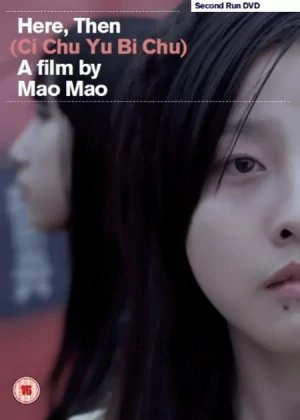Here, Then
There haven't been too many films focusing on China's struggling youth (not the city kids, but the ones living in more rural areas). There is course Zhang Ke Jia who likes to expose the clash of old and new, but apart from Unknown Pleasures even he has remained quite distant when it comes to closing in on Chinese's upcoming generation. Enter Mao Mao's Here, Then [Ci Chu Yu Bi Chu], a film that strikes right at the heart of these youngsters.

Here, Then is one of those rare Chinese film that found international distribution. Thanks to winning the best foreign film prize at the Edinburgh Film Fest, Second Run picked it up and provided an English-friendly release. I should be applauding them really, still I feel a little disappointed that of all Chinese films, it had to be this one that found its way out of China. Not that Mao Mao's debut is a bad film (on the contrary really), but it meets all the typical hardcore arthouse criteria China is known for, rather than picking a sleeker, more modern film to at least try and broaden people's idea of homeland China's film catalogue. Then again, beggars can't be choosers right?
People have been eager to compare Mao Mao's style to Zhang Ke Jia, but I don't really share that opinion. While there are some obvious parallels, Here, Then reminded me more of a Chinese interpretation of Hiroshi Ishikawa's films (Petaru Dansu,Su-ki-da, Tokyo.sora). Where Jia opts for a more natural style, both in visualisation and story, Here, Then is extremely stylized, to the point of being almost completely impenetrable.
Here, Then lacks a central story. It's a collection of vignettes, some of them only a few scenes long. Characters appear and disappear. Some of them reappear a few scenes later, others are never seen again. There is little in the way of communication, nor is there an obvious point to most vignettes. Instead Mao Mao sculpts an image, a feeling that resides in all these characters and defines their actions in some way or another. These kids all lack clear goals and clear motivations to help them enjoy life, instead they just loiter around with a strong air of disillusionment.

Visually Mao Mao's first film is incredibly stylized. Even though there isn't too much in the way of complex camera work, extreme coloring or excessive use of filters, the camera work does stand out as one of the most mesmerizing features of this film. Here, Then has a camera that seems to live separately of the characters operating in front of it. While the camera follows a fixed path, it doesn't necessarily match the actions of the characters, meaning things happen completely off-screen from time to time. It's an effect that Takeshi Kitano used to great effect before, Mao Mao takes it to a new level though. This does however create a sizeable distance between the viewer and the characters, so it's safe to say only a small niche will appreciate this choice.
There isn't much in the way of an actual soundtrack. Apart from a few lame Chinese dance tracks the characters are listening to in-film (though I must admit, they are pretty skilfully integrated), the soundtrack consists of accentuated soundscapes. For the larger part of the film they remain hidden in the background, never grabbing too much attention yet always actively influencing the overall atmosphere. There are a few scenes where Mao Mao pulls the sound forward, often with strong results. It's not something you can put on CD, but it's a solid choice of musical accompaniment nonetheless.
The acting is natural, once again reminiscing the films of Ishikawa. Characters often linger, doing nothing much at all. In one scene they are waiting for a ride to arrive, in another scene they are just walking around on the beach. As there is no real story to tell, this film is more about observing the characters in their everyday life. And I must say, Mao Mao handles her actors really well. They all give convincing, natural performances, aptly conveying the message of the film without being overly emotive.

While there is a lot to appreciate here, I have to admit that the film lost me a few times during its second half. I don't necessarily mind the distant and impenetrable characters, but the film keeps introducing new people at a steady pace where I would've liked it a lot better if Mao Mao had kept a smaller cast. It's hard enough as it is to bond with the characters in this film, and when you finally do they simply disappear, never to return again. It's a bit much for a film that isn't all that easy to grasp in the first place.
It wasn't a deal breaker for me though, there is simply too much to love about this film. The amazing camera work, the strong performances and the moody use of soundscapes make for a dreamy film, even when the subject matter isn't all that rosy. Here, Then is an amazing first film that shows Mao Mao has a lot of potential. It's definitely not for everybody, but if you're used to Asian drama and you don't mind strong arthouse aesthetics, it's a must see.
